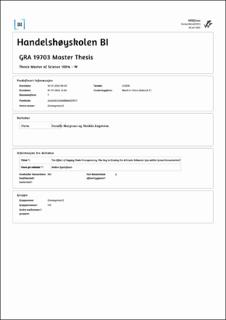The Effect of Supply Chain Transparency: The Key to Closing the Attitude-Behavior Gap within Green Consumerism?
Master thesis
Permanent lenke
https://hdl.handle.net/11250/3038450Utgivelsesdato
2022Metadata
Vis full innførselSamlinger
- Master of Science [1621]
Sammendrag
This master thesis addresses the attitude-behavior gap among sustainable products
and the effects of supply chain transparency. This will give us an indication of
whether companies need to have more transparency in the future and give the
consumer insight into the entire supply chain. The purpose of our research is to
understand the gap between consumers' ethical intentions and actual buying
behavior for green products. Therefore, we want to investigate whether companies
should enhance the level of transparency regarding their supply chain and we have
prepared the following research question: Does supply chain transparency reduce
the attitude-behavior gap for sustainable products by affecting perception of
utilitarian and hedonic value?
Furthermore, the literature review forms the basis for further methodology
and analysis in the research. Based on previous findings, we have developed a
research model that illustrates our understanding of the causal and correlational
patterns across the chosen topic. Therefore, we suggest that supply chain
transparency will act as a moderator of the effect of eco-labels on perceived
utilitarian value, perceived hedonic value and attitude towards the brand. Further,
we suggest that perceived utilitarian and hedonic value will mediate the effect of
eco-labels on attitude towards the brand.
Further, a methodological description forms the basis for the study and the
results. To answer our research question, we have chosen to formulate six
hypotheses. We find it appropriate to conduct an experiment with an attached
quantitative questionnaire, as we want to draw relatively certain conclusions about
how different variables will affect attitude towards the brand. To analyze the
result from the main study and understand the relation between the variables in the
research model, we conducted a regression analysis, mediation analysis and a 2x3
factorial between-subjects ANOVA.
Our findings indicate that it can be favorable to obtain an eco-label on a
brand’s product, if the purpose is to enhance attitudes towards the brand. Further,
our findings indicate that if the supply chain information became too heavy or
complex for the consumer, the enhanced level of information had a negative effect
rather than positive in terms of attitude towards the brand. Based on the results
from the analyzes, we conclusively discuss the possibilities within supply chain
transparency and whether it will have any effect on the attitude-behavior gap
among sustainable products.
Beskrivelse
Masteroppgave(MSc) in Master of Science in Strategic Marketing Management - Handelshøyskolen BI, 2022
